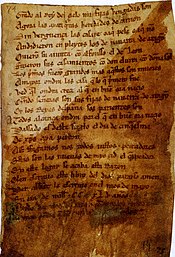Honduran Spanish
This article needs additional citations for verification. (July 2019) |
| Honduran Spanish | |
|---|---|
| Español hondureño | |
| Native to | Honduras |
| Region | Central American Spanish |
Native speakers | 6 million (2014)[1] 112,000 in Honduras (2014) |
Indo-European
| |
Early forms | Old Latin
|
| Latin (Spanish alphabet) | |
| Official status | |
Official language in | |
| Regulated by | Academia Hondureña de la Lengua |
| Language codes | |
| ISO 639-1 | es |
| ISO 639-2 | spa[2] |
| ISO 639-3 | – |
| Glottolog | None |
| IETF | es-HN |
| Spanish language |
|---|
 |
| Overview |
| History |
|
| Grammar |
| Dialects |
|
| Dialectology |
| Interlanguages |
| Teaching |
Honduran Spanish is the Spanish language as spoken in the country of Honduras in Central America. The voseo is routinely used in Honduras.
Phonology[]
- Honduran Spanish, as a Central American variety, pronounces the fricative /x/, represented by ⟨j⟩ and ⟨g⟩, is pronounced as a simple aspiration [h].[3]
- /j/ tends to be very weak, even eliding at times in contact with front vowels.[3]
- Word-final /n/ becomes velarized, as [ŋ].[3]
- /s/ is often aspirated or elided in word- or syllable-final position. As an apparent extension of this, it may even be aspirated in word-initial or word-medial, syllable-initial environments. This word-medial aspiration is most common near morpheme boundaries, and in the pronoun nosotros, 'we'. S-reduction is most common in the north of Honduras. It's less common in areas of Copán Department near the Guatemalan border, in Comayagua, and among the upper classes of Tegucigalpa. [4]
Local words[]
These words are some slang words used in Honduras. Some may also be used in neighboring El Salvador and elsewhere.
- Bululo - bread roll
- Trucha or pulpería - corner shop
- Relajo - mess
- Jura or chepo - police patrol
- Posta - police station
- Maje - dude
- Cipote(a) - kid (male, when it ends with "e"; and female, when it ends with "a")
- Güirro(a) - kid (male, when it ends with "o"; and female, when it ends with "a")
- Juco(a) - Dirty person (male, when it ends with "o"; and female, when it ends with "a")
- Colocho - Curls (in reference to hair)
- Chongo - Bow (gift wrapping)
- Encachimbar - to annoy/upset
- Bolo - Drunk
- Goma - Hangover
- Paila - A bucket. Also used to refer to a pick up truck (Carro Paila)
- Pisto/Billullo - Money
- Chabacán - Trouble Maker
- Guachimán - Security guard (Comes from the English word, Watchman)
References[]
- ^ Spanish → Honduras at Ethnologue (18th ed., 2015) (subscription required)
- ^ "ISO 639-2 Language Code search". Library of Congress. Retrieved 21 September 2017.
- ^ a b c Lipski, John M. (2008). "Central American Spanish in the United States". Varieties of Spanish in the United States. Georgetown University Press. pp. 142–149. ISBN 9781589016514.
- ^ LIPSKI, JOHN M. (1986). "Instability and Reduction of /s/ in the Spanish of Honduras". Revista Canadiense de Estudios Hispánicos. 11 (1): 27–47. ISSN 0384-8167.
Categories:
- Languages of Honduras
- Central American Spanish
- Honduras stubs